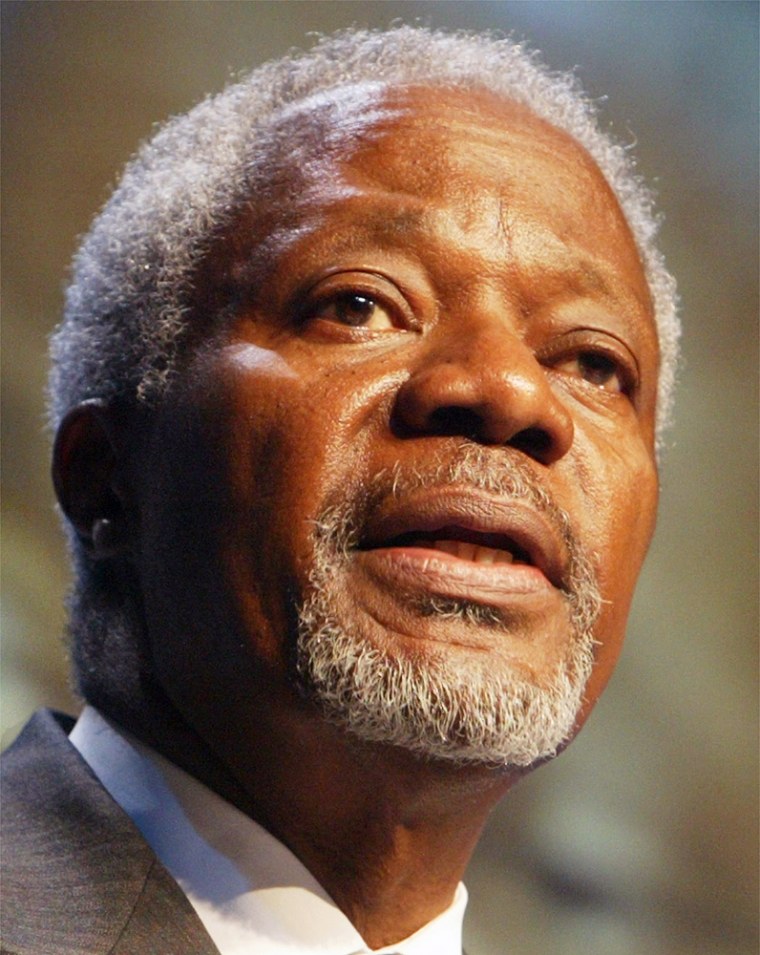A team of U.N. experts should arrive in Iraq within days to assess the feasibility of holding early elections, U.N. Secretary-General Kofi Annan said on Friday.
He said he had received assurances from U.S.-led occupation forces that the team’s security would be protected.
“The coalition has promised to do (the) maximum to protect the team ... so I think in the coming days, the team will travel and start working,” he told journalists on a visit to Brussels.
Annan sent security experts to Iraq earlier this month to examine if it would be safe for U.N. international staff to return to Baghdad, where two deadly bombings in August and September killed special envoy Sergio Vieira de Mello and many other U.N. workers.
The United Nations’ electoral team is expected to examine whether it is possible to hold direct elections before a July 1 deadline for U.S. authorities to hand sovereignty back to Iraqis. The question is one of the most charged facing Iraq.
The United States has argued it is not practical to hold elections before the handover deadline because there are no electoral rolls, there has been a voter registration and national security remains far too volatile.
Rather, U.S. authorities want to set up regional committees to pick a transitional assembly that would in turn select a transitional government to take power from July 1.
A constitution would then be written and full elections held in 2005.
Those plans have been opposed by Iraq’s foremost Shiite cleric, Ayatollah Ali al-Sistani, who has demanded that any government be chosen by a more open electoral process. The cleric’s words are closely followed by Iraq’s Shiites, who make up about 60 percent of the country’s 26 million population.
However, some Iraqis who have held meetings with Sistani, who is seldom seen in public and speaks via intermediaries, say he has indicated that if the United Nations determines elections are impossible before June 30, he will accept their conclusion.
U.N. envoy Lakhdar Brahimi, who Washington is pressuring to take on a role in Iraq, said this week premature elections could do more harm than good.
“If you get your priorities wrong, elections are a very divisive process,” said the former Algerian foreign minister who was previously the chief U.N. envoy to Afghanistan.
Security threats
While Annan may have received security assurances from U.S. forces, the situation on the ground in Iraq remains dangerous.
More than 550 coalition troops, and an estimated several thousand Iraqis, have been killed since the war to overthrow Saddam Hussein was launched in March.
Insurgents carry out almost daily strikes against U.S. and allied troops, on Iraqi security forces and against foreign contractors helping out with reconstruction. Diplomats, journalists and aid workers have also been targeted.
This week, a suicide bomber detonated his car outside a hotel in an upmarket district of central Baghdad, killing a South African contractor and at least two Iraqis. A producer and driver working for CNN were killed in a guerrilla ambush.
In the past two days, a series of attacks countrywide on the Iraqi police and the Iraqi Civil Defense Corps, who insurgents regard as collaborating with the U.S.-led occupation, killed one ICDC officer and wounded at least 12 others.
And late on Thursday, U.S. ordnance experts were called in to defuse a car bomb left by a major road in the north of the country used by military convoys and trucks carrying oil from Iraq’s northern oil fields to a nearby refinery.
